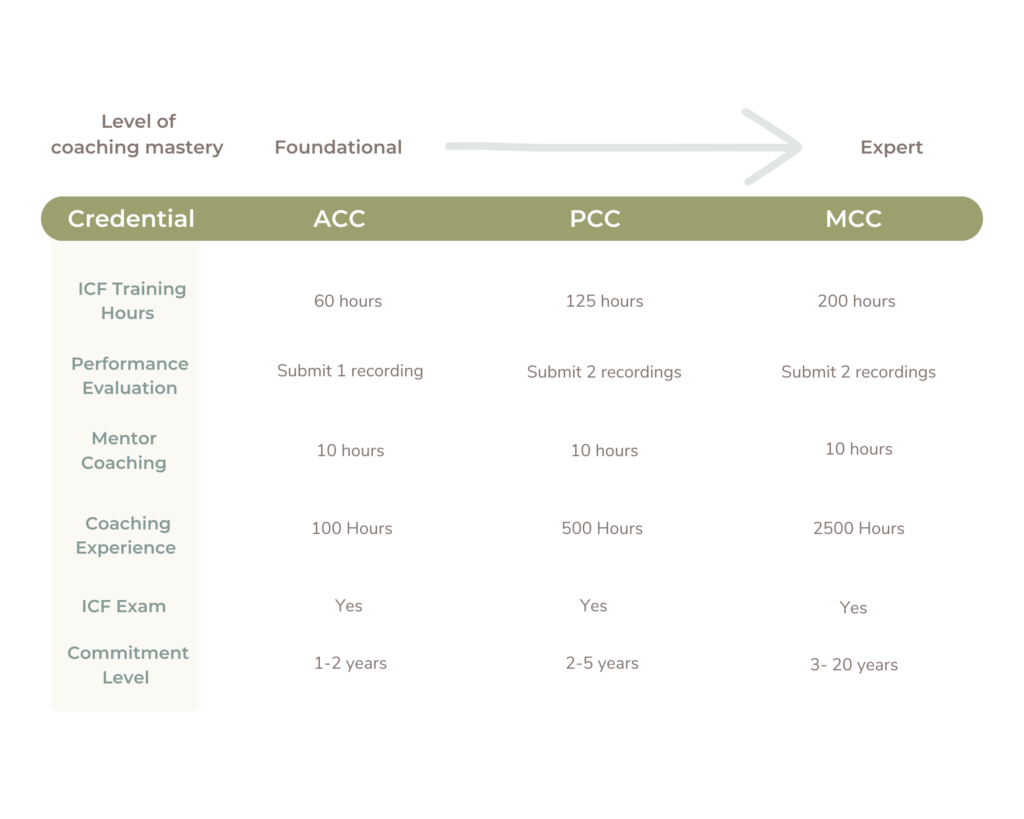
How to Become an ICF Accredited Coach
In this article, we’ll be explaining how to get you on your way to achieving your ICF accreditation.
In today’s modern world, coaching has risen to prominence as a highly sought-after skill that holds significant value for both organisations and their executives and leaders.
As a result, many coaches actively seek accreditation from reputable bodies, and one of the most prominent among them is the International Coach Federation (ICF).
ICF is globally recognised as the primary accrediting and credentialing organisation for coaches. Attaining an ICF Credential signifies that you have successfully met specific criteria and requirements tailored to enhance and hone your coaching abilities.
It serves as a testament to your unwavering commitment to upholding the highest ethical standards in the field of coaching.
So you must be wondering…“How do I kickstart the ICF coaching qualification process?”
Here’s a checklist that will guide you on your path to ICF certification
- Self-Assess – Begin by evaluating your goals and select the ICF credential you wish to pursue
- Educate – Attain the required accredited ICF coach training hours.
- Practice – Join a mentor coaching group to refine your skill
- Review – Complete your performance evaluation successfully
- Experience – Gain valuable coaching experience
- Assess – Sit for the ICF credentialing examination when you’re ready.
–
Start with a self-assessment. Here are 3 types of ICF qualification you can embark on:
- Level 1: Associate Certified Coach (ACC)
- Level 2: Professional Certified Coach (PCC)
- Level 3: Master Certified Coach (MCC)
Don’t skip this stage! Before embarking on this journey, it’s crucial to begin with a personal self-assessment. Ask yourself: What is your coaching ambition? Are you seeking a fundamental grasp of coaching, or do you aspire to elevate your coaching skills to a more advanced level?
–
Level 1: Associate Certified Coach (ACC)
Estimated time commitment: 1-2 years
Become a competent and confident coach – working with clients to achieve personal or business objectives.
Who should enrol: Professionals who are embarking on their coaching journey and aspire to become proficient coaches, effective leaders, or skilled managers. Additionally, HR, career coaches or talent partners looking to refine their coaching skills in various conversations can also benefit from this credential.
–
Level 2: Professional Certified Coach (PCC)
Estimated time commitment: 2-5 years
Become a deeper coach – helping clients to understand what is helping or hindering their work and lives, leading to sustainable change.
Who should enrol: Organisations are now looking for coaches who are PCC trained, hence increasing your chances of attaining coaching projects. PCC is designed for individuals who envision coaching as a career, whether on a full-time or part-time basis.
It’s also well-suited for leaders who recognize the deep advantages of coaching and strive to attain and embed the fullness of coaching in their profession.
–
Level 3: Master Certified Coach (MCC)
Estimated time commitment: 5-20 years
Become the vessel – being fully present with clients to enable them to solve their own problems and develop self-coaching skills.
Who should enrol: MCC is tailored for those who have already accumulated 1000 coaching hours and actively incorporate coaching into their professional life, whether within or outside an organization.
–
To start, you can start your journey with ACC and progress to PCC when you feel prepared. After you’ve determined the path you’d like to pursue, you can then proceed to achieve your ICF accreditation.
Here are 5 steps to become an ICF accredited coach
After selecting your preferred pathway, you can proceed with the certification process before applying for your ultimate accreditation. All three pathways share the same five fundamental steps, with variations in training content and the number of hours required for each credential.

You can easily obtain your coaching certification through an accredited ICF coach training academy like Bailey Balfour. However, to secure your full accreditation, you’ll need to submit your coaching certification, provide evidence of coaching experience, and sit for the ICF credential examination.
While some coaches may choose to conclude their journey after obtaining certification with an accredited ICF coach training academy, those seeking the official stamp of approval and accreditation from ICF will continue through all five steps.
- Accredited ICF coach training
- Mentor coaching
- Performance evaluation
- Coaching experience
- ICF credentialing examination
Step 1: Accredited ICF coach training
Your first step is to gain knowledge and accumulate coaching training hours, which will vary depending on the credietnial you have chosen. For example, you will need 60 hours for ACC and 125 hours for PCC. During this phase, you will engage in coach-specific education that aligns with the ICF’s definition of coaching, adheres to the ICF Core Competencies, and upholds the ICF Code of Ethics.
But before your first step, you’ll need to evaluate various ICF-accredited training academies to partner with. While the methodologies and content across these academies may be similar, the trainers you learn from and the individuals you train alongside can significantly influence the impact of your learning.
Ultimately, your goal isn’t just to complete the training; your goal is to emerge from it with a new found sense of confidence and competence in your coaching abilities.
Step 2: Mentor coaching
Much like the rigorous practice leading up to a tennis match, your coaching journey benefits from dedicated training with a coach over a defined period. It’s during this time that you gain valuable insights into your blind spots, areas for improvement, and your strengths.
Mentor Coaching is an indispensable component of your development as a coach. This process involves you coaching an individual while receiving constructive feedback from your mentor coach, facilitating your growth and refinement as a coach.
Once again, it’s important to seek out an academy or an ICF-accredited coach who can guide you in acquiring the necessary mentor coaching skills for your coaching journey. We recommend finding a PCC or MCC mentor coach.
Click here to view sample material of a mentor coaching group.
Step 3: Performance evaluation
To assess if your coaching ability meets the ICF Core Competencies, you are required to submit a recording of an unedited coaching session lasting between 20 and 60 minutes to your training provider.
The recording will be assessed against a checklist of requirements to ensure you meet the ACC and PCC standards.
Step 4: Coaching experience (Client contact hours)
While you undergo your coach training, you’ll need to start accumulating coaching experience through paid or pro bono clients.
Since you’re only getting started and you might not have a client base, it can be as simple as getting someone you know to buy you a cup of coffee in exchange for a coaching session. Alternatively, some training academies offer peer coaching groups where you’ll meet other people who you will coach (vice versa) to help attain your hours.
Step 5: ICF credentialing examination
Lastly, you are required to sit for a three-hour ICF MCQ examination delivered by computer in a testing center or through Pearson’s OnVUE remote proctored testing service. This examintaion is conducted by ICF and you would require to pay an entrance fee to sit for the examintaion. Once you’ve successfuly passed the exam, you will receive your accreditation which you would have to renew after 3 years. More details can be found on the ICF website.
To sum up…
Seems like a lot to handle? Not to worry. At Bailey Balfour, we offer a one stop shop to assist you in achieving your training hours while receiving top-notch unlimited mentorship hours and 1:1 performance evaluations to fulfill the ICF requirements. We also have a peer coaching group to help you build your coaching experience. Most of our students go on to apply for accreditation and all have successfully passed. The ROI of gaining an accreditation pays off. If you are still unsure about the process, feel free to contact us or join our upcoming free 30 min online information session.
Train with leader’s trusted coach certification academy. Join our upcoming cohort and become a certified coach in 6 months. Find out more.
About the Author
Jean Balfour is Managing Director of Bailey Balfour and Programme Director of our ICF Accredited Coach Training Programmes. Jean is passionate about helping people to have good conversations both at work and at home. She believes that coaching is a life skill and that you never regret learning to coach.


